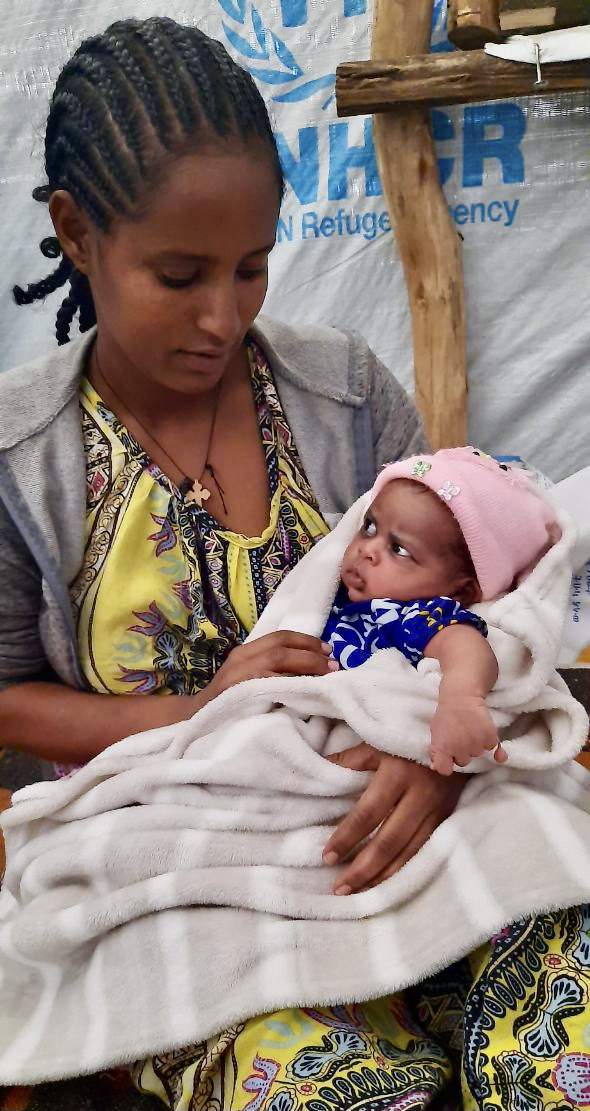News
UNFPA continues life-saving services across war-torn northern Ethiopia
- 10 December 2021
News
Tigray, ETHIOPIA – “They saved my life and that of my daughter. I stayed under their care the whole night and delivered my baby girl safely,” said Selam, who was the first woman to give birth at the Sabacare 4 camp for people internally displaced by ongoing conflict in northern Ethiopia.
After months of living in a school classroom alongside 38 other households, Selam was voluntarily relocated to Sabacare 4 with her husband and toddler. The camp has been set up on the outskirts of Mekelle, the capital of the Tigray region and epicentre of the conflict.
“I went into labour in the middle of the night. I was scared. We came to the Maedot Maternity Waiting Home and they tried to refer me to a hospital, but there was no ambulance or any other vehicle available. I was so afraid to lose my child,” said Selam.

Childbirth can be life-threatening, particularly for young women struggling with displacement, malnutrition and hardly any access to sexual or reproductive health services. To add their plight, food and water are in dangerously short supply in the camp, meaning mothers and newborns are at increasing risk of disease and malnutrition.
Amid these grinding challenges, UNFPA partnered with local NGO Maedot to set up the first of two maternity waiting homes in Mekelle, which provide care to pregnant women and even housing for those close to their delivery date or facing complications. These services were sorely needed at Sabacare 4. “The UNFPA reproductive health kits and medical equipment, including a solar panel for electricity, have been very helpful in providing emergency care day and night,” said Rahwa Gedamu, a nurse at the camp’s clinic.
Towering challenges
The reality is stark for pregnant women like Selam in Tigray, where a year of brutal war has left some 5.2 million people in need of humanitarian relief and an estimated 3.8 million need access to health care. Up to 3 million people have been displaced across northern Ethiopia, more than 2 million of whom in Tigray.
OCHA reports that since mid-October, no humanitarian assistance has been allowed to enter the region, including medical equipment and medicine. Many health partners have reduced or even suspended mobile health units as they run out of fuel, cash and supplies.
Combined with destroyed and ransacked health facilities, this puts the lives of nearly 118,000 pregnant women and their future children at ever greater risk in Tigray. Some 13,000 births are expected each month, over half of which will likely experience complications, with potentially deadly consequences if access to emergency obstetric care is not made available as soon as possible.
‘The situation is grave’
As the conflict rages into a second year, midwifery services are crucial in a situation where OCHA estimates that 80 per cent of medication is no longer available and more than half of health facilities are not functional. The latest figures show over 60 per cent of pregnant and lactating mothers to be suffering from malnutrition, leaving many struggling to breastfeed. “We receive between 10 to 15 cases of malnutrition a day, of which at least two are critical. The situation is grave,” said Dr. Fiseha Gebreegziabher at Maedot.
Staff are working around the clock, Ms. Gedamu added. “I used to work at a hospital in Mai Kadra before I fled to Mekelle. Since then, I have been volunteering day and night for almost a year to save the lives of women.”
“The women I met with were desperately focused on daily survival, repeating their need for the most basic support: food and medicine,” UN Under-Secretary-General for Humanitarian Affairs Martin Griffiths said after listening to women, including survivors of gender-based violence, receiving support from UNFPA. “The world must help them imagine a brighter future for themselves and their children.”
Delivering hope and saving lives
Since the outbreak of the conflict in November 2020, UNFPA has provided over 900 sexual and reproductive health kits across northern Ethiopia, including nearly 600 in Tigray alone. This comes on top of medical supplies for 34 facilities that reached over 200,000 people, and health workers deployed to ensure maternal and sexual and reproductive health services. More than 40,000 conflict-affected women received midwifery support across northern Ethiopia, and thousands of dignity kits were distributed to vulnerable women and girls.
UNFPA is also scaling up its support to one-stop centres, which offer a space in which survivors of sexual and gender-based violence can seek clinical care and psychosocial counselling. As access constraints and rampant violence in Tigray leave countless women and girls vulnerable to life-threatening physical and psychological damage, these services are crucial not only for providing immediate help, but also for longer-term recovery from the trauma inflicted on them.
Despite these dire circumstances, Ms. Gedamu said: “Every time we save a life like Selam and her daughter’s, we feel very proud and motivated to continue serving our people.”
Selam meanwhile told UNFPA, “If they hadn’t been here that night, I wouldn’t be here today. I have named my daughter Maedot in honour of them saving our lives.”